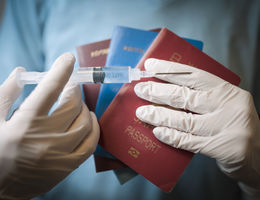

Post-Traumatic Stress Disorder (PTSD) is a mental health condition that can develop after a person endures a traumatic event. The silent aftermath of a traumatic experience, such as a serious accident, assault, violence, bullying, natural disasters, terrorist acts, war/combat, death, losing a job, and more, can affect a person’s mental and physical health.
“Many people think they have to witness a traumatic event to develop PTSD, but that's not the case,” says Iulia Bogdan, a Clinical Therapist at Loma Linda University Behavioral Medical Center. “You don't have to directly experience the trauma yourself. Witnessing someone else go through it, or even learning about something traumatic, can also lead to PTSD.”
The American Psychiatric Association estimates that one in 11 people will be diagnosed with PTSD in their lifetime. Although PTSD is highly individualistic, common symptoms can manifest in diverse ways, including distressing dreams, flashbacks, avoidance, dissociation, and distorted beliefs.
However, Bogdan addresses some less common symptoms of PTSD that should not be overlooked.
Attention and concentration
PTSD is sometimes misdiagnosed as Attention-Deficit Hyperactivity Disorder (ADHD). “The reason for this,” Bogdan says, “is because it can mimic ADHD symptoms like the inability to focus and concentrate.”
Medical News Today states that PTSD and ADHD have overlapping symptoms, such as restlessness, losing focus easily, hyperactivity, impulsivity, difficulty doing certain tasks, being organized, or managing emotions. However, symptoms exclusive to trauma include headaches, racing heart, digestive issues, emotional responses, and nightmares.
Guilt and Shame
Intense feelings of guilt and shame ––– including survivor’s guilt ––– are less-discussed symptoms of PTSD. Individuals might blame themselves for the traumatic event or feel guilty for surviving when others didn’t. This can lead to self-destructive behaviors, depression, and an unwillingness to seek help due to feelings of unworthiness.
Physical Symptoms
Physical symptoms can be misdiagnosed as another medical condition when they are related to PTSD. These can include:
-
Headaches
-
Weight gain
-
Weight loss
-
Stomach aches
-
IBS symptoms
-
Muscle aches
-
Chronic pain
-
Poor digestion
PTSD can also affect someone’s ability to tolerate physical touch.
How long does PTSD last?
There is no limit to the impact of trauma.
“Research is showing that trauma does not leave our bodies,” Vidauri says regarding the length of time PTSD effects can last. “There are a lot of misconceptions that a person has a certain amount of time to endure their trauma before they are supposed to get over it, but studies show that trauma tends to store in our bodies.”
To help alleviate the symptoms of PTSD, Bodgan highlights the importance of getting help for the trauma. “Though the trauma never leaves, getting therapy, spiritual guidance, or reaching out to loved ones can help reduce the impact of the trauma.”
It’s important to remember that rushing through trauma recovery can invalidate a person’s experience and hinder their healing process.
What to do if you or a loved one have symptoms of PTSD
If someone is experiencing symptoms of PTSD, the first step is to seek a medical diagnosis from a doctor. “Getting linked to professional help is the most crucial step toward understanding and managing PTSD effectively,” Bogdan says.
PTSD is a common diagnosis, and Bogdan emphasizes that trauma responses are a normal reaction to an abnormal situation and "everyone deserves help."
If PTSD is causing suffering in your life or the life of someone you care about, visit our behavioral health services website to learn more about how Loma Linda University Behavioral Medical Center can help.

